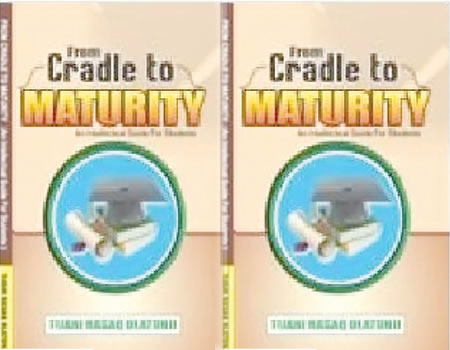FROM Cradle to Maturity is an interesting, educative and illuminating book and a collection of well-researched intellectual and inspirational topics for developing the young generations, youths and students, for better future.
Success in life does not entail only academic training, as it also needs good moral upbringing, which provides children with the values to live their lives with.
Sadly, today’s society avails the younger ones with few or no role models, where millions of students are taught the wrong values or no value at all.
This culture of callousness has led to moral decadence, cultism, school violence, teenage pregnancy, crime and drug abuse and alcoholism.
Fortunately, this book is emerging at the right time to right the wrong and provide the missing link. The author, Tijani Rasaq Olatunji, regrets the gradual destruction of society and proffers solutions to curb the menace.
All through in the book, the author juxtaposes the relationship between academic performance and moral excellence, while analysing the steps our youths can take so as not to become a burden to the society.
The book consists of 14 chapters, each dealing with specific aspect of the subject matter.
Chapter one deliberates on self-discovery and the need to obey natural instinct in choosing one’s career or course of study in order to have sound foundation.
Chapter two discusses adaptation to change and benefit inherent in keeping one’s eyes on the ball, and how one should avoid regrets and crying over spilt-milk.
Chapter three encourages one not to be sad and to always have a positive perspective about life. And that one should view any challenge as a stepping stone to a greater height.
Chapter four teaches how to set reasonable goals in life and to always have a plan, as failure to plan is tantamount to planning to fail.
Chapter five highlights how one’s potential can be explored for self development and the need to prioritise one’s pursuit.
Chapter six is a poetic chapter on friendship, and it x-rays conditional and unconditional friendship, an illustration of ‘Show me your friend and I will tell who you are.’
Chapter seven reveals the secret key to success and mistakes to avoid to be successful in life; it also answers a rhetoric question of “is time actually money?”
Chapter eight is about setting SMART (Specific, Measurable, Achievable, Realistic and Time bound) objectives and analysis of the goal triangle.
Chapter nine advances discussion on why learning should be continuous from cradle to grave.
Chapter 10 warns on the repercussion of being arrogant as no one is indispensable and pride goes before a fall.
Chapter 11 elaborates the composition of education as being academic, morals, attitude and character building.
Chapter 12 answers the question of what is next after exiting the four walls of the campus of academic citadel, that is, after graduating from the world of fantasy to the world reality.
Chapter 13 epitomises character traits and the benefits of ingenuity, creativity, intuitiveness, wisdom and intelligence.
Chapter 14 unveils the evil of drug abuse, alcoholism, cultism and the danger associated with youthful exuberance, high crime rate and promiscuity.
In his words, the author opines that, “If this book, From Cradle to Maturity, is the only thing I can give back to the society as my own due and rent for the space I occupy, I think history will remember me for some good. This is an expression of confidence on a book that reveals the mechanisms of achieving life success and plays a guiding role in lives of many a student and youths who are forced onto the path of no mentor.”
Having read through this compendium of pathways to success, I have no reservation in commending it to all stakeholders in the education and training of the younger generation as a refreshing material to update and broaden their knowledge on youth development. It is a must-read for every student of higher learning as it contains ingredients for academic success and good moral standard.






